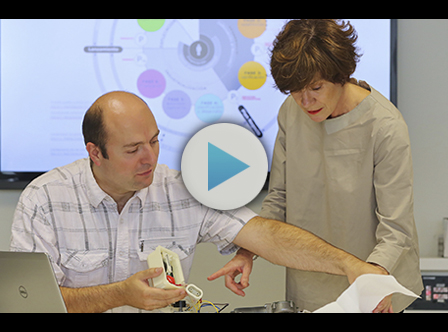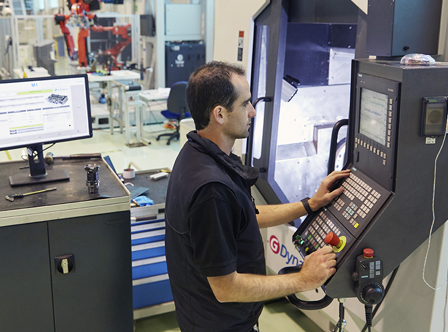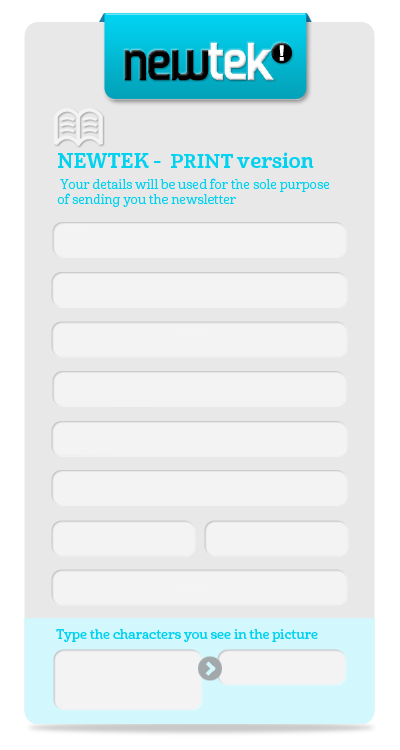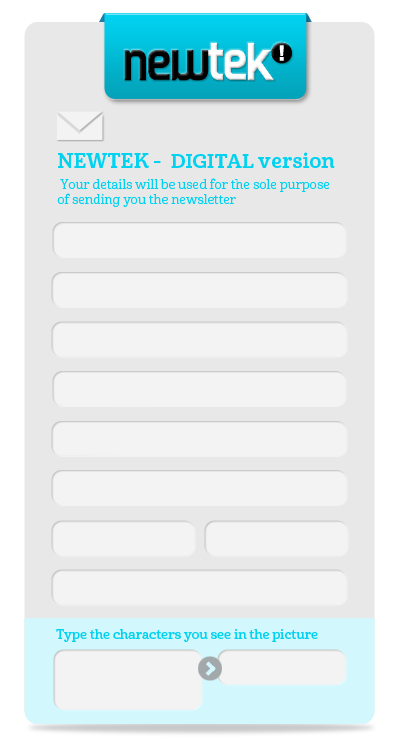PROJECTS
Flexible automation, modelling and machine-process simulation, machine Health assessment, process optimisation and machine fleet management are some of the enabling technologies proposed by IK4-TEKNIKER to be incorporated to machines.
Industry 4.0 has been incorporated to manufacturing processes at medium and large size companies.
The challenge currently being addressed by the machine tool sector is related to where it stands in relation to the so-called "Industry 4.0" revolution that offers multiple opportunities generally resulting from an ever-growing digitisation of products and services.
From a technological perspective, there are many possibilities, although the question that potential buyers and users of these machines are asking is "how can I benefit from them?" The answer will depend on each individual case.
In order to structure the analysis on “what could make my company more competitive and what kind of a performance requirements should my machine meet”, it would be useful to have a reference model as shown in the following figure.
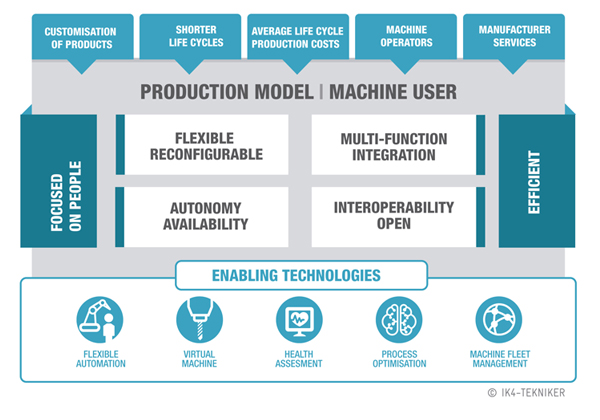
It must be stressed that this model is an adaptation to the machine tool heading of the general Industry 4.0 model used at IK4-TEKNIKER to diagnose and identify opportunities Industry 4.0 opportunities.
Hereunder is a description of the most relevant enabling technologies that users of machine tools can resort to as a support.
Flexibility and reconfigurability: Flexible robotics
The first operation performed in a machining process consists in loading the part on predefined tooling. This is usually done manually, although when automated, special systems are built for this operation that are predefined by the specific features of the parts. This explains loading systems are barely flexible and very difficult to reconfigure.
IK4-TEKNIKER can offer a comprehensive solution (bin picking, artificial vision, trajectory generation, force control, etc.) that allows companies to increase machine productivity and reduce costs associated with loading and unloading operations that are usually performed manually.
The solution is geared towards companies that machine parts on flexible manufacturing cells and machining centres.
Virtual machines: Modelling and machine-process simulation
The ultimate goal is to carry out in-depth research on technologies used for simulation (of machines and processes), data analysis and monitoring to configure a sufficiently resilient hybrid modelling platform to allow machine manufacturers and users significantly optimise (in terms of time and cost) their designs, ramp-up and production life cycles and also meet new requirements by simultaneously upgrading their quality and reliability ratios.
Health assessment
Machine monitoring performed by efficient, sensitive, distributed and global sensors featuring multi-variable monitoring devices allows users to obtain continuous real-time information on the condition of several machine components, production process status and the variable environment that surrounds production.
In addition to fitting internal and external sensors, IK4-TEKNIKER proposes that a number of very simple and rapid machine tests be run to discover the condition of a machine by analysing the evolution of several parameters over time. This is what IK4-TEKNIKER calls “Fingerprint”.
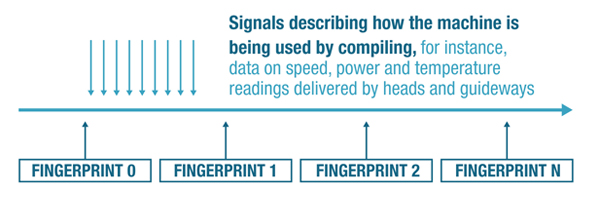
This allows for machine operational checks and controlled health assessment.
This system allows machine health assessments to be made whenever operational and maintenance decisions must be taken. You can also anticipate the presence of geometric errors on parts by moving towards "zero defects", which is essential, particularly if high-value parts are involved.
Process optimisation
Until now, theoretical simulation models analysed the machine tool and the machining process independently, without any kind of interaction.
Nowadays, however, platforms equipped with different simulation models are being developed to globally analyse machines and their machining processes. This technology is connected to a new simulation concept that embraces both the process and the machine.
Simulation models, moreover, have been in the design stage as predictive models to obtain information prior to performing an operation. Nowadays, however, there have been significant changes as results can be used for online monitoring during the machining stage.
Multi-target optimisation strategies have been developed so that, based on information compiled in real time and on a number of pre-established models and patterns, production resources can take autonomous and smart decisions with regard to process parameters and dynamic conditions of various mechanical components, to ensure, in each particular case, that production targets are achieved (costs, production, power consumption, machine conditions, etc.). This process optimises manufacturing practices.
Fleet management: From a single machine to fleet management
In a first step, machines must be fitted with sensors and monitoring devices covering different simulation models, so the machine and the process can operate in a coordinated manner (in a closed loop) and be enhanced by “Fingerprint” trials to optimise processes and perform health assessments on different machine components.
Once this important step has been taken, the next move consists in ascertaining the condition of a manufacturer's entire fleet.
